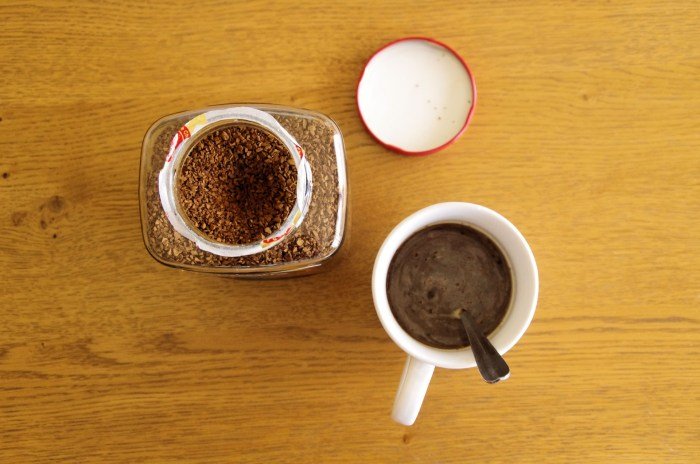Is instant coffee bad for health – Is instant coffee bad for your health? This question has sparked debate among coffee enthusiasts and health-conscious individuals alike. While instant coffee offers convenience and a quick caffeine fix, concerns arise regarding its processing methods, ingredients, and potential health implications.
Let’s delve into the world of instant coffee, exploring its nutritional content, potential risks, and how it compares to traditional coffee.
Instant coffee is a widely consumed beverage, offering a convenient alternative to traditional brewing methods. It involves extracting coffee beans, drying the extract, and then transforming it into granules or powder. This process differs significantly from traditional brewing, where coffee beans are roasted and ground before being steeped in hot water.
While instant coffee provides a quick caffeine boost, questions linger about its impact on health, particularly in comparison to its traditional counterpart.
Instant Coffee Processing and Ingredients

Instant coffee, a convenient and readily available beverage, is produced through a distinct process that differs significantly from traditional coffee brewing. Understanding the methods and ingredients involved can shed light on its potential health implications.
Instant Coffee Processing
Instant coffee undergoes a unique processing method to create a concentrated form that can be easily dissolved in hot water. The process typically involves:
- Green Coffee Bean Roasting:Similar to traditional coffee, green coffee beans are roasted to develop their flavor and aroma.
- Grinding and Brewing:The roasted beans are ground and brewed using hot water, creating a strong coffee extract.
- Water Removal:The brewed coffee extract is then concentrated by removing water through methods like freeze-drying or spray drying.
- Drying and Packaging:The concentrated coffee is dried and packaged into soluble granules or powder, ready for instant consumption.
Key Ingredients in Instant Coffee
Instant coffee primarily consists of coffee extract, but additional ingredients may be added to enhance flavor, texture, or stability. These can include:
- Sugar:Added to sweeten the coffee and improve its taste. Excessive sugar intake can contribute to health problems like weight gain, tooth decay, and diabetes.
- Artificial Sweeteners:Some instant coffee varieties may use artificial sweeteners, such as aspartame or sucralose, to reduce sugar content. However, concerns exist regarding the potential health effects of artificial sweeteners.
- Flavorings:Instant coffee may contain flavorings, such as caramel, vanilla, or hazelnut, to enhance its taste. While generally considered safe, excessive consumption of artificial flavorings may raise concerns about potential health impacts.
- Additives:Other additives, like emulsifiers, stabilizers, or preservatives, may be included to improve the coffee’s texture, shelf life, or consistency. These additives are generally considered safe in small quantities, but their long-term effects are not fully understood.
Caffeine Content in Instant Coffee
Caffeine is a stimulant naturally present in coffee. The caffeine content of instant coffee can vary depending on the brand and preparation method, but generally, it contains a similar amount of caffeine as traditional brewed coffee. A typical cup of instant coffee contains approximately 80-100 milligrams of caffeine.
Moderate caffeine consumption (up to 400 milligrams per day) is generally considered safe for most adults. However, excessive caffeine intake can lead to adverse effects such as anxiety, insomnia, and headaches.
Nutritional Content of Instant Coffee

Instant coffee, while convenient, is often perceived as a less healthy option compared to traditional brewed coffee. However, understanding its nutritional profile can help determine its impact on your health.
Nutritional Value of Instant Coffee
Instant coffee is generally lower in caffeine than traditional coffee, with an average cup containing about 30-60 milligrams of caffeine, compared to 80-100 milligrams in brewed coffee. Instant coffee is also lower in antioxidants, with a significantly lower concentration of chlorogenic acid, a key antioxidant linked to numerous health benefits.
Comparison to Traditional Coffee
- Caffeine Content:Instant coffee typically has lower caffeine content than traditional coffee, with an average cup containing about 30-60 milligrams compared to 80-100 milligrams in brewed coffee.
- Antioxidant Content:Instant coffee is generally lower in antioxidants than traditional coffee, particularly chlorogenic acid, a potent antioxidant associated with various health benefits.
- Other Nutrients:Both instant and traditional coffee provide small amounts of vitamins and minerals, including riboflavin, niacin, and potassium, although the exact amounts can vary depending on the type of coffee and brewing method.
Potential Benefits and Drawbacks of Instant Coffee, Is instant coffee bad for health
While instant coffee may contain fewer antioxidants than traditional coffee, it can still contribute to your daily intake of these beneficial compounds. However, the lower caffeine content may be a benefit for those sensitive to caffeine’s effects.
- Energy Boost:The caffeine in instant coffee can provide a temporary energy boost, improving alertness and focus. However, excessive caffeine intake can lead to anxiety, insomnia, and other adverse effects.
- Antioxidant Benefits:Although lower than traditional coffee, instant coffee still contains some antioxidants, which can contribute to overall health by protecting against cell damage and reducing the risk of chronic diseases.
- Potential Health Concerns:Instant coffee may contain added sugars, artificial flavors, and other additives, which can negatively impact health. Choosing sugar-free instant coffee and limiting intake can minimize these risks.
Potential Health Risks Associated with Instant Coffee: Is Instant Coffee Bad For Health

While instant coffee offers convenience and a quick caffeine fix, it’s essential to be aware of potential health risks associated with its consumption. While instant coffee is generally considered safe for most people, excessive consumption or specific ingredients can contribute to certain health concerns.
Additives and Preservatives
Instant coffee often contains additives and preservatives to enhance its flavor, extend shelf life, and improve its consistency. These additives can potentially impact health, especially for individuals with sensitivities or allergies.
- Artificial Sweeteners:Some instant coffee brands contain artificial sweeteners like aspartame or sucralose. These sweeteners can contribute to digestive issues, headaches, and even potential long-term health risks in some individuals.
- Flavorings:Instant coffee often includes artificial flavors to mimic the taste of roasted coffee beans. These flavors can be derived from chemicals and may trigger allergic reactions in some individuals.
- Preservatives:Preservatives like sodium benzoate or potassium sorbate are added to extend the shelf life of instant coffee. These preservatives can potentially contribute to digestive issues or allergic reactions in sensitive individuals.
Excessive Consumption and its Effects
Excessive consumption of instant coffee, regardless of the type, can lead to various health issues.
- Sleep Disruption:Caffeine, a stimulant present in coffee, can interfere with sleep patterns. Excessive consumption, especially close to bedtime, can lead to insomnia and difficulty falling asleep.
- Anxiety and Nervousness:High caffeine intake can trigger anxiety, nervousness, and restlessness in some individuals. This effect is more pronounced in those sensitive to caffeine.
- Digestive Issues:Instant coffee, particularly due to its acidity, can irritate the stomach lining and contribute to heartburn, indigestion, and other digestive discomforts.
Instant Coffee vs. Traditional Coffee

Instant coffee and traditional coffee, while both derived from the same coffee bean, offer distinct experiences in terms of taste, aroma, brewing methods, and health implications. Understanding these differences can help you make an informed choice based on your preferences and health goals.
Taste and Aroma
The taste and aroma of instant coffee and traditional coffee differ significantly due to their processing methods. Instant coffee tends to have a more bitter and less nuanced flavor profile compared to traditional coffee. This is because the roasting and brewing processes involved in instant coffee production can result in the loss of some of the delicate flavor compounds present in the coffee beans.
Traditional coffee, on the other hand, offers a wider range of flavors, from fruity and floral to chocolatey and nutty, depending on the bean variety, roast level, and brewing method. The aroma of traditional coffee is also generally richer and more complex, as it retains more of the volatile compounds responsible for its fragrance.
Brewing Methods
Instant coffee requires no brewing process, as it is already pre-brewed and dehydrated. Simply add hot water to the instant coffee granules, and you have a cup of coffee ready to drink. Traditional coffee, on the other hand, requires a brewing process, such as using a French press, drip coffee maker, or espresso machine.
This process involves steeping coffee grounds in hot water for a specific duration, allowing the coffee’s flavor and aroma to extract into the water.
Health Benefits and Risks
Both instant and traditional coffee offer potential health benefits, such as improved cognitive function, reduced risk of certain diseases, and increased energy levels. However, there are also some potential health risks associated with coffee consumption, such as increased anxiety, insomnia, and heart palpitations.
Health Benefits
- Antioxidant Properties:Coffee is a rich source of antioxidants, which can help protect your cells from damage caused by free radicals. Both instant and traditional coffee contain antioxidants, although the exact amount may vary depending on the type of coffee and brewing method.
- Improved Cognitive Function:Caffeine, a stimulant found in coffee, can enhance alertness, focus, and cognitive performance. Studies have shown that moderate coffee consumption can improve memory, reaction time, and overall cognitive function.
- Reduced Risk of Certain Diseases:Some studies suggest that coffee consumption may be associated with a reduced risk of developing certain diseases, such as type 2 diabetes, Parkinson’s disease, Alzheimer’s disease, and some types of cancer. However, more research is needed to confirm these findings.
Health Risks
- Increased Anxiety:Caffeine can stimulate the nervous system, leading to increased anxiety and restlessness in some individuals. People who are sensitive to caffeine may experience anxiety, jitters, and difficulty sleeping after consuming coffee.
- Insomnia:Consuming coffee close to bedtime can interfere with sleep, as caffeine can block adenosine, a neurotransmitter that promotes sleepiness.
- Heart Palpitations:Caffeine can increase heart rate and blood pressure, which can lead to heart palpitations in some individuals. People with pre-existing heart conditions should consult with their doctor before consuming coffee.
Key Differences between Instant and Traditional Coffee
| Feature | Instant Coffee | Traditional Coffee |
|---|---|---|
| Processing | Pre-brewed and dehydrated | Roasted and ground beans, brewed with hot water |
| Ingredients | Coffee extract, additives (e.g., sugar, flavorings) | Roasted coffee beans, water |
| Nutritional Content | Lower in antioxidants, higher in sugar and additives | Higher in antioxidants, naturally caffeine-rich |
| Taste and Aroma | Bitter, less nuanced flavor, less complex aroma | Wider range of flavors, richer and more complex aroma |
| Health Implications | May contain added sugars and additives, potential for higher caffeine intake | Naturally caffeine-rich, potential for higher antioxidant intake |
Moderation and Individual Considerations

While instant coffee can be a convenient option, it’s essential to remember that moderation is key when it comes to coffee consumption, regardless of the type. Just like with any other beverage or food, consuming too much coffee, even instant coffee, can lead to potential health issues.
Recommended Daily Intake
The recommended daily intake of caffeine varies depending on individual factors such as age, health conditions, and sensitivity to caffeine. However, most health organizations suggest limiting caffeine intake to 400 milligrams per day for healthy adults. This equates to about four cups of brewed coffee.
Instant coffee typically contains less caffeine than brewed coffee, but it’s still important to be mindful of your intake.
While instant coffee can be a convenient option, it’s important to consider its potential health impacts. The processing involved can sometimes strip away beneficial antioxidants, and the added sugars and artificial ingredients can contribute to health concerns. However, the focus on health shouldn’t overshadow the pursuit of pure beauty , which often encompasses a holistic approach to well-being.
Ultimately, moderation is key when it comes to instant coffee, allowing you to enjoy its convenience without compromising your health goals.
Individual Factors
Several individual factors can influence the suitability of instant coffee consumption.
Health Conditions
Individuals with certain health conditions, such as high blood pressure, anxiety, or insomnia, may need to limit or avoid caffeine altogether. It’s always advisable to consult with a healthcare professional to determine the appropriate level of coffee consumption based on your specific health needs.
Medication Use
Some medications can interact with caffeine, potentially leading to unwanted side effects. It’s crucial to check with your doctor or pharmacist to ensure that coffee consumption, including instant coffee, won’t interfere with your medications.
Personal Preferences
Ultimately, personal preferences play a significant role in determining how much instant coffee you choose to consume. If you enjoy the taste and find it convenient, you can incorporate it into your diet, keeping in mind the recommended daily intake and potential health considerations.
Making Informed Choices
To make informed choices regarding instant coffee consumption, consider the following:
Read Labels
Pay attention to the caffeine content listed on instant coffee packages. This information will help you monitor your daily intake and adjust your consumption accordingly.
Listen to Your Body
Pay attention to how your body reacts to coffee. If you experience any adverse effects, such as increased anxiety, heart palpitations, or difficulty sleeping, consider reducing your intake or switching to decaffeinated options.
Choose High-Quality Options
While instant coffee is generally considered less healthy than freshly brewed coffee, some brands offer higher-quality instant coffee options with fewer additives and preservatives. Look for brands with simple ingredient lists and avoid those with excessive sugar or artificial flavors.
While instant coffee might not be the healthiest choice, it’s certainly not the worst thing you can put in your body. If you’re concerned about the potential effects of caffeine, you can always try using a gentler skincare routine like the one offered by first aid beauty repair cream , which is known for its soothing and hydrating properties.
In the end, the best way to determine if instant coffee is bad for your health is to listen to your body and make informed choices based on your individual needs.
Balance Your Diet
Ensure that your diet is balanced and includes plenty of fruits, vegetables, and whole grains. A healthy diet can help offset the potential negative effects of excessive caffeine intake.
While instant coffee might not be the healthiest choice, it’s not necessarily a major health concern. If you’re looking for a comprehensive health plan in Michigan, you might want to check out the meridian health plan of michigan , which offers a range of coverage options.
Of course, a balanced diet and regular exercise are always important for overall well-being, regardless of your coffee preferences.
Last Recap

In conclusion, while instant coffee may offer convenience and a quick caffeine fix, its processing methods, ingredients, and potential health implications warrant careful consideration. Understanding the nutritional content, potential risks, and differences between instant and traditional coffee empowers informed choices regarding coffee consumption.
Ultimately, moderation is key, and individual factors like health conditions and preferences should guide your coffee consumption habits.
Commonly Asked Questions
Is instant coffee addictive?
Like traditional coffee, instant coffee contains caffeine, which can be addictive. However, the level of addiction depends on individual factors like caffeine sensitivity and consumption habits.
Does instant coffee cause acidity?
Instant coffee can contribute to heartburn or acid reflux in some individuals due to its acidity. However, the extent of acidity varies depending on the brand and individual tolerance.
Is instant coffee good for weight loss?
Instant coffee itself doesn’t directly promote weight loss. However, its caffeine content can boost metabolism and increase energy expenditure, potentially aiding weight management when combined with a healthy diet and exercise.
Can I drink instant coffee during pregnancy?
Moderate caffeine consumption during pregnancy is generally considered safe. However, it’s advisable to consult with your doctor about the appropriate amount of caffeine intake based on your individual circumstances.